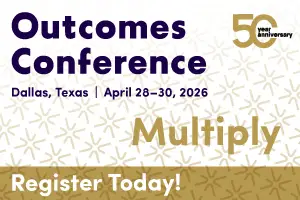Nonprofit Risk: An Interview with Gallagher’s Peter Persutti
Back to Blog

Perspectives on Managing Nonprofit Risk
Christian Leadership Alliance President and CEO Tami Heim recently interviewed Peter Persuitti, Global Managing Director, Nonprofit | Religious Practices, Gallagher. They explored the theme of this edition of Outcomes, “Risk.”
For more than 22 years, Peter Persuitti has led a specialized group of consultants, claims administrators, and brokers. Gallagher is the world’s third-largest broker of insurance/reinsurance, consulting, risk management, and claims administration services, with over 50,000 employees in 800-plus locations. While a Fortune 500 company today with numerous verticals (specialty industries), Gallagher’s history in serving the church and its ministries is part of its legacy going back to 1927. This legacy is embedded within its “Gallagher Way” culture of servant leadership and teamwork.
Today, Gallagher professionals serve more than 34,000 nonprofits, from small to large entities with dozens to hundreds of locations. Gallagher also mobilizes its staff around the work in service to mission-based charities (corporate match giving, tracking volunteer hours, etc.) Earlier this year, Gallagher recognized Persuitti at a global leadership meeting with the “Gallagher Way” award.
At Gallagher, Persuitti has been a thought leader and collaborator, working internally to foster innovation, connections, and learning while working externally to engage clients and the broader sector in capacity building and collaboration. Formerly, Persuitti was a leader of nonprofits with Munich RE, among the largest reinsurers in the world. He has also held leadership positions in boarding schools, universities, and healthcare foundations. He has more than 40 years of experience in the nonprofit field.
Persuitti is a founding trustee of faith-based Princeton Academy in Princeton, NJ, and serves on Christian Leadership Alliance’s National Advisory Council. He received a B.A. from the Jesuit University of Scranton and advanced degrees (ABD) from Ohio State University. As a Classicist, he has held academic fellowships abroad in Rome, Italy, and Athens, Greece.
Why is risk management so vital for Christian ministries?
It is one of many manifestations of our call to stewardship. Risk management incorporates science, knowledge, and cultural change in positive ways to safeguard people, assets, and reputation, all vital aspects of ministries’ sustainability.
In your opinion, are Christian nonprofits doing enough to prepare for risk today?
It would not be fair to answer laconically no, as so many nonprofits have ‘invested’ talent, money, and time in creating safe environments, training and advocating for the vulnerable, funding appraisals, and using analytics. “Duty of Care” is often a legal phrase to describe the concept of ‘doing all you can’ with the knowledge and resources you have. However, many nonprofits need help resourcing their ministries effectively and efficiently, whether due to a talent shortage or funding constraints.
We encourage partnerships – with local community faith partners and local authorities (police, fire, rescue) to help fill the gap and widen the influence of success. We are encouraged by the interest many successful business leaders have shown in moving from a life of success to one of significance in leading ministries.
How can ministry boards and CEOs lead well in the risk management arena?
Risk is uncertainty, and we alleviate that pastorally with prayer and guidance through the Holy Spirit and professionally with mitigation and avoidance strategies (and insurance). Also, risk is an opportunity (to change, to survive, to respond, to grow, to evolve), and we need to leverage this impact potential with discernment and ongoing strategic level assessment (Enterprise Risk Management “ERM”). That means boards and nonprofit leaders must make ‘risk’ a commitment, a standing item on every agenda. Engage specialists to help you do the RiskMap exercise as a start – at Gallagher, we offer this at no cost.
How does Gallagher help nonprofits address risk in property, casualty, management liability, cyber, etc.?
We begin with our unique, comprehensive methodology called CORE360®, which focuses on the six cost drivers of your total cost of risk. Today, we are in the most severe and challenging insurance market of our lifetime, and nonprofits’ continued increase in premiums is unsustainable. It is a growing threat to their future impact. (This has presented a tremendous opportunity for Gallagher’s specialists to consider/create “programs” and alternative risk financing solutions to stabilize premiums). We also have access to subject matter experts in so many areas of risk that relate to ministries’ exposures, including youth protection, special events, third-party contractual transfers and indemnification, cyber risk, pastoral professional liability, appraisal programs, international missions, workers’ compensation, nurse triage, and others. Also, our claims advocacy work supports our ministries’ challenges from litigation and trending legal abuse.
As global managing director for nonprofit | religious practices, what are your team’s key focus areas? What are you most encouraged about in that work today?
Internally, there is incredible ‘muscle’ in collaborating, sharing, partnering, solving, and serving. Connecting and mobilizing this talented experience and marshaling this expertise is paramount. Our culture is team-oriented (and worthy of a reference – The Gallagher Way.) We are fortunate to carry a legacy of our faith-based work as the foundation on which we have built a Fortune 500 global enterprise.
We no doubt have the most significant number of specialists serving this third sector of any consultant globally. (Recall that we have other brands in the Gallagher family like Artex, Gallagher Re, RPS, Gallagher Bassett, Risk Program Administrators, Gallagher Charitable, etc.). Add to this our investments in technology and analytics, and we have a very impactful platform to serve the world’s ministries. Externally, we are focused on growing affordable options for financing risk (insurance), providing easy, quick access to specialists, and sharing insightful information (peer benchmarking, loss ratios, trends).
We are better together. So, we are encouraged by blending service providers and ministries around the common ground of serving and being there for society. We see remarkable and resilient collaboration networks (like Christian Leadership Alliance) that will enable us as an ‘ecosystem’ to serve better and have a sustainable impact. And isn’t that what our joint mission is all about?
####
Enjoy All the Articles in the Winter Edition of Outcomes Magazine.

Frank Markow’s book is a comprehensive and practical examination of organizational behavior, culture, and health. Seminaries should include a course with this book for every student. Nonprofit leaders should read this and walk their leaders through several sections of this book, especially the chapters on emotional intelligence, emerging approaches to leadership, and organizational culture.”
Craig Domeck, dean and associate professor of leadership (retired), Palm Beach Atlantic University; founder and principal, 3-D Leadership Development
Table of Contents
- Perspectives on Managing Nonprofit Risk
- Why is risk management so vital for Christian ministries?
- In your opinion, are Christian nonprofits doing enough to prepare for risk today?
- How can ministry boards and CEOs lead well in the risk management arena?
- How does Gallagher help nonprofits address risk in property, casualty, management liability, cyber, etc.?
- As global managing director for nonprofit | religious practices, what are your team's key focus areas? What are you most encouraged about in that work today?
- Enjoy All the Articles in the Winter Edition of Outcomes Magazine.
CLA Membership
Join Christian
Leadership Alliance
A commitment to membership unlocks a more comprehensive access to content, community, and experiential learning. Here are the three membership exclusives that exist to significantly accelerate your professional growth and personal development.








